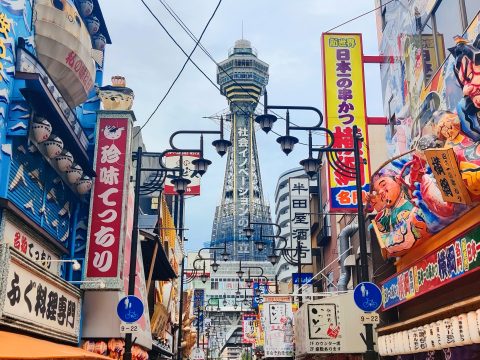Japanese work culture: Prejudice and reality part 1
WORK’IN JAPAN
15.12.2024

Chasing My Dream to Japan
Like most foreign workers in Japan, deciding to look for a job and move to Japan, has been a life-changing experience for me. Having fallen in love with Japanese culture as a teenager, it was always my dream to someday, live and work in Japan. Japanese work culture, however, doesn’t have the best reputation around the world. Japan is known for its long working hours and strict, usually unwritten rules, which can be difficult to understand as a non-Japanese person. Therefore, to say that my friends and family were worried when I told them that I was moving to Japan would be an understatement. I was prepared to work hard and to simply do what it takes to live here, but honestly, the doubts and fears from people around me, who honestly never visited Japan, made me wonder if it would all be worth it. I decided to trust my gut feeling, take the leap and my short answer to this question would be: yes, it’s worth it.
Reality of Working in Japan
My long answer is that like everything in life, it depends on the person. It depends on where you’re originally from, what your life was like in your own country, and what your reason is for living in Japan. One thing we all have in common is that we need to earn a living wage. For many people, this is the main reason why they move to Japan. The salaries here are higher than in many other (Asian) countries, making it a good or even necessary solution to work here to provide for family back home. On the other hand, if you’re from a country where wages are higher than in Japan, moving here might seem like a downgrade. My friends back in the Netherlands were shocked that here, I earn only about two-thirds of what I would earn there. However, daily expenses like food (especially eating out), public transportation, and taxes can easily cost 3 times less in Japan. Besides that, post-pandemic inflation in Japan has been incredibly low, compared to many other countries around the world.

Rules and Adaptation
Regarding company policies and etiquette, I’ve noticed that companies with many foreign employees tend to actually write down a lot of their rules. This might make it seem more strict than in your own country, but in this way there are less or even no unwritten rules, making it actually more comfortable in my opinion. This way, there are few things that you can do wrong and there is no grey area or any dilemmas to consider because you can just follow the rules that were handed to you in the beginning. In case your company is less straightforward about the rules and regulations, my advice would be to simply copy what other employees do. Or at least in your first few months. Again, this is an easy way to not break any rules, to fit into the team and you’ll surely get more freedom once you gained your supervisor’s trust. Although getting used to the work culture here can be difficult at first, your work environment and situation will depend a lot on your own willingness to adapt and work hard. Because after all, being comfortable at your workplace is a big factor in having a comfortable life in Japan.

Mietta Varszegi
Mietta grew up in the Netherlands and moved to Japan in 2019 to work as an English teacher. Now, she has 3 different jobs, explores Tokyo on days off and takes trips around Japan whenever she can. But everywhere in Japan, the goal is the same: visit as many shrines, castles and parks as possible and eat everything!
Read previous articles by the writer
Read latest articles
KEYWORDS
- # PICKPICK
- # Resume
- # alcohol
- # Rice
- # Soup
- # winter food
- # Fast Food
- # seafood
- # spicy foods
- # raw food
- # fermented food
- # Transportation
- # MEAT
- # Edo culture
- # suits
- # clothing
- # drink
- # fish
- # seasoning
- # Japanese New Years Foods
- # Toshikoshi soba
- # Osechi Ryori
- # Ozoni
- # Christmas
- # Japanese fusion pasta
- # Wafu Pasta
- # Japanese Hot Pot
- # なべ
- # 鍋
- # Miyazaki
- # Chicken Nanban
- # Karamen
- # Autumn Wagashi
- # Mushi-yokan
- # Imo-yokan
- # Japanese Autumn Fruits
- # Autumn
- # Vending Machine
- # fall
- # dango
- # Chestnut rice
- # saury
- # Mushroom
- # Rice vinegar
- # Japanese condiments
- # 調味料
- # Sake
- # Mirin
- # Soy sauce
- # Japanese Noodles
- # Udon
- # Ramen
- # Yakisoba
- # Soba
- # Japanese Seaweed
- # 海藻
- # かいそう
- # Payslip
- # Training
- # Japanese summer foods
- # 和菓子
- # Wagashi
- # ryokucha
- # 夏
- # 飲み物
- # Ramune
- # ラムネ
- # Pokari Sweat
- # ポカリスエット
- # Calpis
- # カルピス
- # Mugicha
- # ume
- # 梅
- # うめ
- # umeshu
- # job hunting
- # tofu
- # Recruitment in Japan
- # miso
- # Japanese cuisine
- # Yellowtail and bonito
- # Children’s Day
- # Kashiwa Mochi
- # Chimaki
- # fruits
- # Kusamochi
- # Types of Agriculture in Japan
- # bread
- # パン
- # パン屋さん
- # japanese bread
- # shokupan
- # meal blead
- # anko bread
- # 桜
- # さくら
- # cherry blossom
- # visa
- # hanami
- # omotenashi
- # sakura
- # おもてなし
- # Japanese hospitality
- # oshibori
- # wet hand towel
- # hand towel
- # restaurant
- # Commuting in Japan
- # Women-only cars
- # Exit gate
- # japanese train
- # train
- # valentine
- # Japanese sweets
- # 朝食
- # Japanese Breakfast
- # Breakfast
- # Japanese
- # 日本
- # healthy
- # persimmons
- # hoshigaki
- # HR
- # work in Japan
- # jinji ido
- # corporate systems
- # Japanese work culture
- # bento
- # ekiben
- # shinkansen
- # omiyage
- # train station
- # Japanese culture
- # work culture
- # mentaiko
- # umeboshi
- # Japanese snacks
- # potato chips
- # Japanese potato chips
- # Japanese writing
- # seaweed
- # konbu
- # ocean foods
- # shio konbu
- # dashi
- # miso soup
- # food processing
- # pear
- # nashi
- # sweet potato
- # japanese sweet potato
- # stingray
- # satsuma imo
- # food value chain
- # homecooking
- # agriculture
- # Japanese homecooking
- # farming
- # nikujaga
- # shojin ryori
- # meat and potatoes
- # traditional foods
- # comfort food
- # buddhist food
- # manufacturing
- # factory
- # eihire
- # vegetarian
- # food and beverage
- # izakaya
- # yatai
- # japanese festival
- # taiyaki
- # matsuri
- # summer
- # Ikayaki
- # smart agriculture
- # shaved ice
- # kakigori
- # かき氷
- # summer dessert
- # Japan
- # Japanese foods
- # dessert
- # fruit
- # matcha
- # icecream
- # Pikcup
- # Pikc up
- # Pcikup
- # skilled labor visa
- # working visa japan
- # Dineer Table in Japan
- # Japanese manner
- # Japanese food
- # Japanese Table Manner
- # Chopsticks
- # Japanese traffic signs
- # traffic information
- # road rules in Japan
- # chocolate
- # green tea
- # Osaka
- # Work Japan
- # Japanese company
- # ikura
- # sushi
- # nigiri
- # wasabi
- # PCIK
- # PICK UP
- # PICK
- # PICKUP







